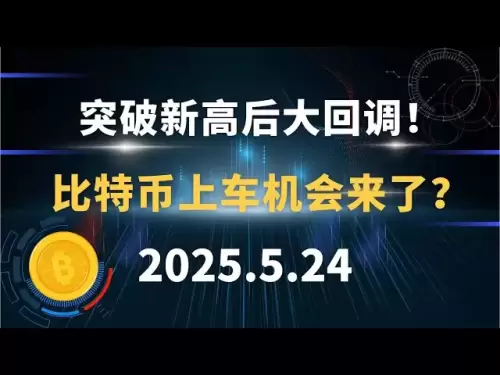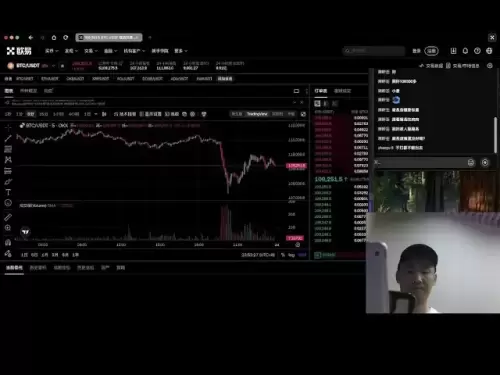-
 Bitcoin
Bitcoin $108,083.4917
-2.22% -
 Ethereum
Ethereum $2,548.5237
-4.15% -
 Tether USDt
Tether USDt $1.0001
0.07% -
 XRP
XRP $2.3377
-3.39% -
 BNB
BNB $668.6655
-2.28% -
 Solana
Solana $174.6368
-3.46% -
 USDC
USDC $0.9998
0.01% -
 Dogecoin
Dogecoin $0.2279
-6.29% -
 Cardano
Cardano $0.7585
-6.13% -
 TRON
TRON $0.2725
-0.22% -
 Sui
Sui $3.6622
-4.23% -
 Hyperliquid
Hyperliquid $33.0522
-5.79% -
 Chainlink
Chainlink $15.7402
-5.31% -
 Avalanche
Avalanche $23.1528
-7.47% -
 Stellar
Stellar $0.2902
-3.51% -
 Bitcoin Cash
Bitcoin Cash $428.5769
-1.87% -
 Shiba Inu
Shiba Inu $0.0...01442
-6.26% -
 UNUS SED LEO
UNUS SED LEO $8.8118
-0.58% -
 Hedera
Hedera $0.1916
-5.65% -
 Toncoin
Toncoin $3.0208
-3.74% -
 Litecoin
Litecoin $96.6253
-3.32% -
 Monero
Monero $396.1936
1.71% -
 Polkadot
Polkadot $4.5883
-6.69% -
 Bitget Token
Bitget Token $5.5250
-4.33% -
 Pepe
Pepe $0.0...01396
-9.64% -
 Pi
Pi $0.7803
-1.88% -
 Dai
Dai $0.9997
0.00% -
 Ethena USDe
Ethena USDe $1.0006
0.05% -
 Aave
Aave $258.9171
1.61% -
 Uniswap
Uniswap $6.1373
-4.64%
How does blockchain technology work? What are its practical applications?
Blockchain is a distributed ledger used in cryptocurrencies like Bitcoin, ensuring secure transactions through decentralized validation and cryptographic security.
May 23, 2025 at 11:01 pm

Blockchain technology is a revolutionary system that has transformed the world of cryptocurrency and beyond. At its core, blockchain is a distributed ledger that records transactions across numerous computers in such a way that the registered transactions cannot be altered retroactively. This technology is the backbone of cryptocurrencies like Bitcoin and Ethereum, ensuring secure and transparent operations.
What is a Blockchain?
A blockchain is essentially a chain of blocks, where each block contains a list of transactions. Each block is linked to the previous one through a cryptographic hash, forming an immutable chain. This structure ensures that once a transaction is recorded, it cannot be changed without altering all subsequent blocks, which would require consensus from the majority of the network.
How Does Blockchain Work?
The process of adding a new block to the blockchain involves several steps. When a new transaction occurs, it is broadcasted to a network of computers, known as nodes. These nodes validate the transaction using complex algorithms to ensure its legitimacy. Once validated, the transaction is grouped with others into a block.
Miners then compete to solve a cryptographic puzzle to add the new block to the chain. The first miner to solve the puzzle gets to add the block and is rewarded with cryptocurrency. This process, known as mining, is crucial for maintaining the integrity and security of the blockchain.
Key Features of Blockchain Technology
Blockchain technology offers several key features that make it unique and valuable. Decentralization is one of the most significant aspects, meaning there is no central authority controlling the network. Instead, it operates on a peer-to-peer basis, which enhances security and reduces the risk of fraud.
Transparency is another critical feature. All participants in the network have access to the entire blockchain, allowing anyone to verify transactions. This transparency, combined with the immutability of the ledger, ensures a high level of trust among users.
Security is maintained through cryptographic means. Each block contains a hash of the previous block, and altering any block would require re-mining all subsequent blocks, which is practically infeasible given the computational power required.
Practical Applications of Blockchain Technology
Blockchain technology has numerous practical applications beyond cryptocurrencies. One of the most promising areas is supply chain management. By using blockchain, companies can track the journey of products from manufacturer to consumer, ensuring transparency and reducing the risk of fraud. Each step in the supply chain can be recorded on the blockchain, providing an immutable record that can be audited by all parties involved.
In the realm of finance, blockchain technology is being used to create smart contracts. These are self-executing contracts with the terms directly written into code. Once the conditions are met, the contract automatically executes, reducing the need for intermediaries and lowering transaction costs. This application is particularly useful in areas like insurance, where claims can be processed automatically and transparently.
Healthcare is another sector where blockchain is making significant strides. By storing patient records on a blockchain, healthcare providers can ensure the security and privacy of sensitive data. Patients can control access to their records, and the immutability of the blockchain ensures that once data is entered, it cannot be altered without permission.
In the field of voting systems, blockchain can enhance the security and transparency of elections. By recording votes on a blockchain, it becomes possible to audit the results in real-time, reducing the risk of fraud and ensuring the integrity of the electoral process.
Blockchain in Cryptocurrency
The most well-known application of blockchain technology is in cryptocurrencies. Bitcoin, the first and most famous cryptocurrency, uses blockchain to record transactions securely and transparently. Each transaction is verified by network nodes and recorded on the blockchain, ensuring that no double-spending occurs.
Ethereum, another major cryptocurrency, takes blockchain technology a step further with the introduction of smart contracts. These contracts allow for more complex transactions and applications, such as decentralized applications (dApps), which run on the Ethereum blockchain.
Challenges and Considerations
While blockchain technology offers numerous benefits, it also comes with challenges. Scalability is a significant concern, as the current infrastructure of many blockchains struggles to handle a high volume of transactions efficiently. Efforts are being made to address this through technologies like sharding and layer-two solutions.
Energy consumption is another issue, particularly with proof-of-work blockchains like Bitcoin. The mining process requires significant computational power, leading to high energy usage. Alternative consensus mechanisms, such as proof-of-stake, are being developed to address this problem.
Regulatory compliance is also a consideration. As blockchain technology becomes more widely adopted, governments and regulatory bodies are working to establish frameworks to ensure its use aligns with existing laws and standards.
Frequently Asked Questions
Q: How does blockchain ensure the security of transactions?
A: Blockchain ensures the security of transactions through several mechanisms. Each transaction is verified by multiple nodes in the network, ensuring its legitimacy. Once verified, the transaction is added to a block and linked to the previous block through a cryptographic hash. This creates an immutable chain of blocks, making it extremely difficult to alter any transaction without consensus from the majority of the network.
Q: Can blockchain be used for purposes other than cryptocurrency?
A: Yes, blockchain technology has a wide range of applications beyond cryptocurrency. It can be used in supply chain management to track the journey of products, in finance to create smart contracts, in healthcare to secure patient records, and in voting systems to enhance the integrity of elections, among other uses.
Q: What is the difference between public and private blockchains?
A: Public blockchains, like Bitcoin and Ethereum, are open to anyone and are fully decentralized. Anyone can participate in the network, validate transactions, and mine new blocks. Private blockchains, on the other hand, are controlled by a single organization or a group of organizations. Access to the network is restricted, and the consensus process is managed by the controlling entity. Private blockchains are often used for enterprise applications where control and privacy are important.
Q: How does the concept of decentralization work in blockchain technology?
A: Decentralization in blockchain technology means that there is no central authority controlling the network. Instead, the network operates on a peer-to-peer basis, where all participants have equal power. Transactions are validated and recorded by multiple nodes across the network, ensuring that no single entity can control or manipulate the ledger. This decentralized nature enhances the security and trustworthiness of the system.
Disclaimer:info@kdj.com
The information provided is not trading advice. kdj.com does not assume any responsibility for any investments made based on the information provided in this article. Cryptocurrencies are highly volatile and it is highly recommended that you invest with caution after thorough research!
If you believe that the content used on this website infringes your copyright, please contact us immediately (info@kdj.com) and we will delete it promptly.
- Polygon (MATIC) Co-Founder Mihailo Bjelic Steps Away from Project After Seven Years
- 2025-05-24 15:30:13
- Troller Cat ($TCAT) Is the Top Meme Coin to Buy and Hold Right Now
- 2025-05-24 15:30:13
- Just a day after Bitcoin reached its all-time high, another piece of news arrived that caused a pullback.
- 2025-05-24 15:25:13
- Shiba Inu (SHIB) Loses Ground to BONK and Lightchain AI
- 2025-05-24 15:25:13
- Bitcoin (BTC) – Eyes Set on ATH, But Volatility Remains
- 2025-05-24 15:20:19
- Crypto Expert Warns of Potential Exhaustion in Meme Coin Rally
- 2025-05-24 15:20:19
Related knowledge
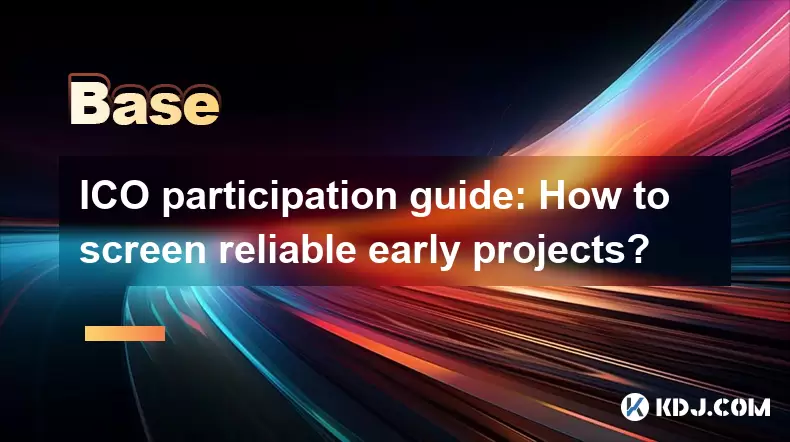
ICO participation guide: How to screen reliable early projects?
May 24,2025 at 12:07am
Introduction to ICOsInitial Coin Offerings (ICOs) are a popular method for new cryptocurrency projects to raise funds. In an ICO, a project sells its native tokens to investors in exchange for established cryptocurrencies like Bitcoin or Ethereum. While ICOs offer the potential for high returns, they also come with significant risks, including the possi...

Cryptocurrency position management: How to dynamically adjust the investment ratio?
May 23,2025 at 08:21pm
Cryptocurrency position management is a crucial skill for any investor looking to maximize returns while minimizing risks. Dynamically adjusting the investment ratio involves regularly reviewing and rebalancing your portfolio to ensure it aligns with your risk tolerance, market conditions, and investment goals. This article will guide you through the pr...

In-depth Interpretation of DAO: How Smart Contracts Enable Governance
May 24,2025 at 09:42am
In the world of cryptocurrency and blockchain technology, the concept of a Decentralized Autonomous Organization (DAO) has garnered significant attention. A DAO leverages smart contracts to enable a new form of governance that is decentralized and autonomous. This article will provide an in-depth interpretation of DAO, focusing on how smart contracts en...
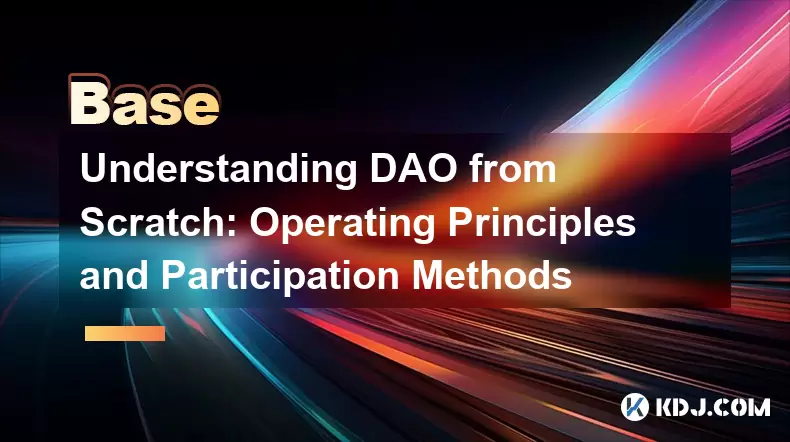
Understanding DAO from Scratch: Operating Principles and Participation Methods
May 23,2025 at 10:08pm
Understanding DAO from Scratch: Operating Principles and Participation Methods A Decentralized Autonomous Organization (DAO) represents a groundbreaking approach to organizational structure within the cryptocurrency and blockchain ecosystem. DAOs operate on blockchain technology, enabling a decentralized and transparent method of governance and decision...
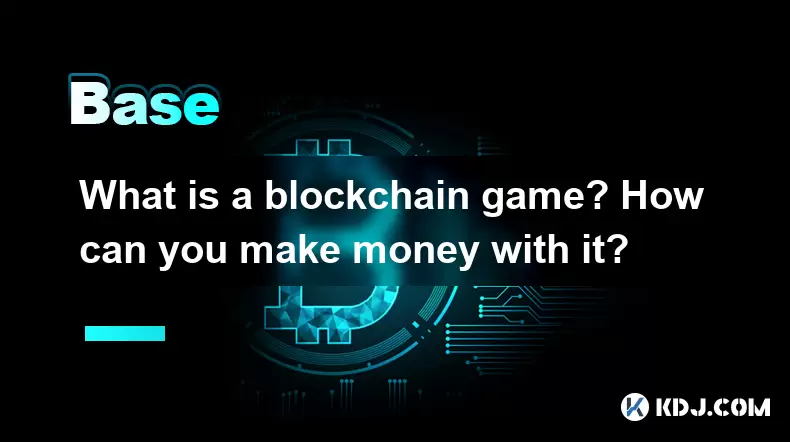
What is a blockchain game? How can you make money with it?
May 24,2025 at 08:28am
A blockchain game is a type of video game that integrates blockchain technology into its core mechanics, allowing for secure and transparent transactions, as well as the creation and trading of in-game assets. These games often utilize cryptocurrencies and non-fungible tokens (NFTs) to enable players to own, buy, sell, and trade unique digital items. Bl...
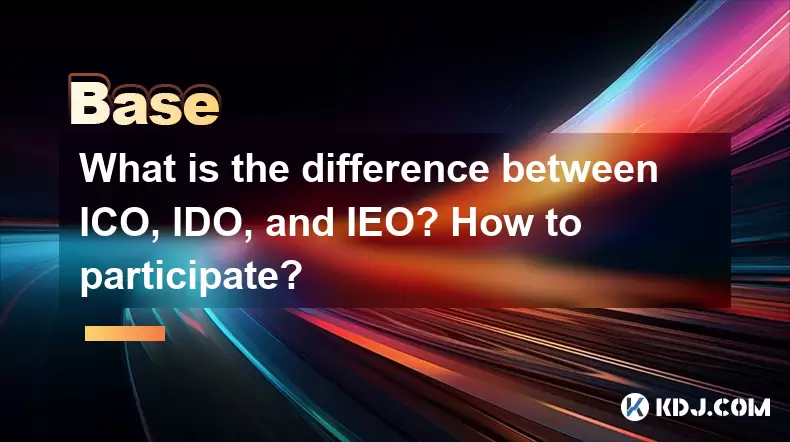
What is the difference between ICO, IDO, and IEO? How to participate?
May 23,2025 at 06:35pm
Introduction to ICO, IDO, and IEOThe cryptocurrency market has evolved significantly over the years, introducing various methods for raising funds and launching new projects. Among these methods, Initial Coin Offering (ICO), Initial DEX Offering (IDO), and Initial Exchange Offering (IEO) have become popular avenues for new blockchain projects to secure ...

ICO participation guide: How to screen reliable early projects?
May 24,2025 at 12:07am
Introduction to ICOsInitial Coin Offerings (ICOs) are a popular method for new cryptocurrency projects to raise funds. In an ICO, a project sells its native tokens to investors in exchange for established cryptocurrencies like Bitcoin or Ethereum. While ICOs offer the potential for high returns, they also come with significant risks, including the possi...

Cryptocurrency position management: How to dynamically adjust the investment ratio?
May 23,2025 at 08:21pm
Cryptocurrency position management is a crucial skill for any investor looking to maximize returns while minimizing risks. Dynamically adjusting the investment ratio involves regularly reviewing and rebalancing your portfolio to ensure it aligns with your risk tolerance, market conditions, and investment goals. This article will guide you through the pr...

In-depth Interpretation of DAO: How Smart Contracts Enable Governance
May 24,2025 at 09:42am
In the world of cryptocurrency and blockchain technology, the concept of a Decentralized Autonomous Organization (DAO) has garnered significant attention. A DAO leverages smart contracts to enable a new form of governance that is decentralized and autonomous. This article will provide an in-depth interpretation of DAO, focusing on how smart contracts en...

Understanding DAO from Scratch: Operating Principles and Participation Methods
May 23,2025 at 10:08pm
Understanding DAO from Scratch: Operating Principles and Participation Methods A Decentralized Autonomous Organization (DAO) represents a groundbreaking approach to organizational structure within the cryptocurrency and blockchain ecosystem. DAOs operate on blockchain technology, enabling a decentralized and transparent method of governance and decision...

What is a blockchain game? How can you make money with it?
May 24,2025 at 08:28am
A blockchain game is a type of video game that integrates blockchain technology into its core mechanics, allowing for secure and transparent transactions, as well as the creation and trading of in-game assets. These games often utilize cryptocurrencies and non-fungible tokens (NFTs) to enable players to own, buy, sell, and trade unique digital items. Bl...

What is the difference between ICO, IDO, and IEO? How to participate?
May 23,2025 at 06:35pm
Introduction to ICO, IDO, and IEOThe cryptocurrency market has evolved significantly over the years, introducing various methods for raising funds and launching new projects. Among these methods, Initial Coin Offering (ICO), Initial DEX Offering (IDO), and Initial Exchange Offering (IEO) have become popular avenues for new blockchain projects to secure ...
See all articles




















